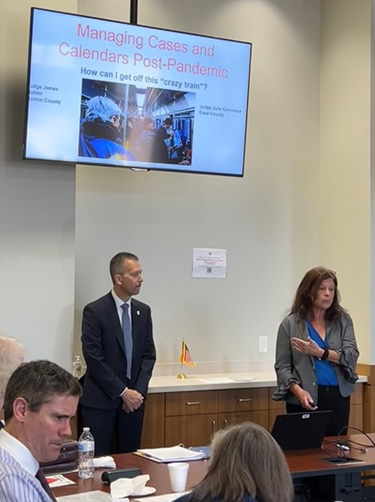
Judge Julie Genovese, Dane County Circuit Court, addresses a group of judges during a training session held in Eagle River on Sept. 23, as co-presenter, Judge James C. Babler, Barron County Circuit Court, looks on. The judicial duo recently held five training sessions on case management practices across the state.
Effective calendar management is an essential skill judges need to help them keep cases moving efficiently and effectively through the circuit courts. This skill has become even more important given the backlog of cases many counties are confronting since the COVID-19 pandemic. In response to this challenge, Director of State Courts Randy R. Koschnick approved a training program for judges on how to improve case management skills and address the current case backlog. Barron County Circuit Court Judge James C. Babler and Dane County Circuit Court Judge Julie Genovese, who have experience teaching Case and Calendar Management at the Judicial College, were asked to provide training to their colleagues at five locations from April through September, 2022.
The judges developed a new training session specifically aimed at educating judges on how to manage their calendars post-pandemic, focusing primarily on felony cases. A number of circuit courts are dealing with a significant felony backlog, which is defined as the difference between the number of pending felony cases on March 1, 2020, just before the pandemic, and a subsequent measurement date selected for comparison’s sake.
At the time this article was written in early October, for example, there was a backlog of 15,054 cases statewide, representing a 55% increase in the number of felony cases pending on March 1, 2020. Judge Babler and Judge Genovese were clear to emphasize that the COVID-19 pandemic did not create this current felony backlog, but only exacerbated it. Court statistics show the number of pending felony cases across the state had been increasing every year since 2015. Backlog estimates vary by county, depending on local circumstances and factors. The specific objectives of the training were to:
- Assist judges in understanding caseflow management issues in their counties and courtrooms;
- Provide an explanation for how judges can use their Judicial Dashboard to effectively manage caseflow; and
- Discuss strategies to improve caseflow management in counties.
The presenters emphasized that how judges manage their case load affects everyone in the justice system, including attorneys, litigants, victims, witnesses, law enforcement, and the public in general.
The Challenges
At each training, the presenters facilitated a discussion among judges regarding what barriers posed the most significant challenges to disposing of felony cases efficiently. Participants consistently identified the following issues:
- Lack of attorneys and staff in the District Attorney’s and Public Defender’s Offices
- Requests for adjournments
- Delays in getting reports and lack of availability of witnesses from the Wisconsin State Crime Laboratory and the Wisconsin State Laboratory of Hygiene
- Trials getting delayed when defendants are charged with a new crime prior to trial
The Solutions
After identifying the barriers to moving cases quickly through the system, the presenters led a discussion that focused on possible solutions to address these challenges. Judge Babler and Judge Genovese stressed the importance for counties to be willing to try new approaches to managing cases, regardless of historical practices. Some of the suggested strategies for improving caseflow management included:
- Routinely use the Judicial Dashboard to monitor cases and determine what cases need attention. Specifically, focus on the information contained in the Age of Pending, Clearance Rates, and Time to Disposition reports found in the Statistics section of the Dashboard.
- Create a culture in the county where everyone has the expectation that cases will move through the system as efficiently and effectively as possible. Judges must work with their local stakeholders to ensure everyone involved can feasibly implement the policies the court establishes. Judges in multi-judge counties were encouraged to work collaboratively to establish similar protocols that are consistent across branches so attorneys and litigants know what to expect in terms of case processing.
- To address the shortage of attorneys, be flexible, especially for those taking public defender appoints. Allow attorneys to appear by Zoom whenever possible to eliminate long drives from county to county. Consider blocking hearings for attorneys who appear on multiple cases so they can more effectively manage their own calendars.
- To avoid extra delays in cases, only allow attorneys to withdraw from cases when absolutely necessary.
- Reduce the number of adjournments and continuances granted. Set the expectation among practitioners that court deadlines will be strongly enforced.
- Set firm trial dates and issue scheduling orders establishing deadlines for pretrial motions, exchange of witness and exhibit lists, jury instructions, etc. Most cases will not settle unless a trial date is set.
- Schedule future hearings from the bench before the case is adjourned so everyone leaves knowing the date of the next proceeding. Clerks can provide paper notice to the defendant, which can avoid future delays. Encourage the Clerk of Court’s Office to provide text message notifications to defendants if the county does not already do so.
These trainings served as a valuable reminder of the significant impact case management has on the entire justice system and the importance of judges continually working to hone this skill. Although the training was originally developed to assist counties in addressing the pandemic-related backlog, these practices will help counties more effectively manage their cases into the future.
Director Koschnick expressed his sincere thanks and appreciation to Judge Babler and Judge Genovese for their willingness to develop this training and for sharing their time and expertise in an effort to improve the administration of justice across the state.

